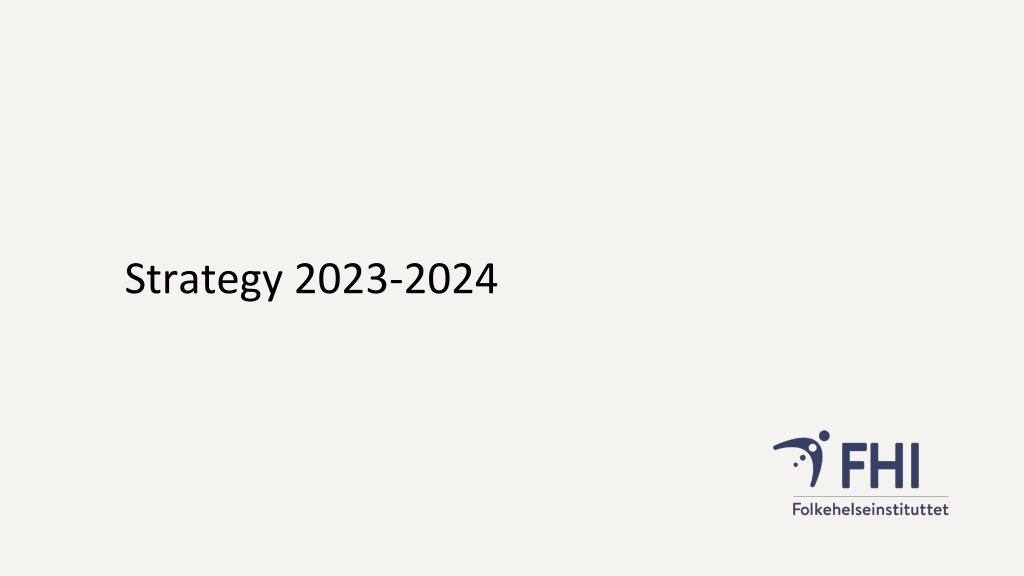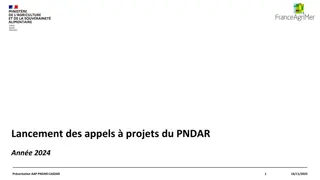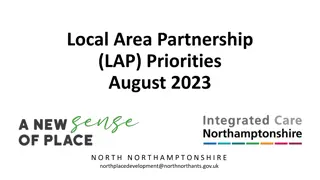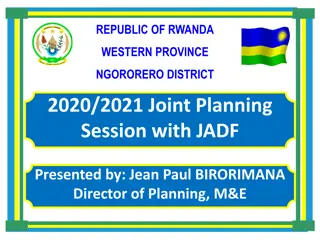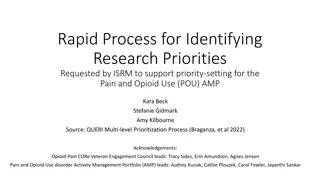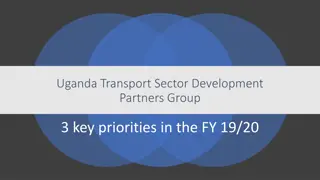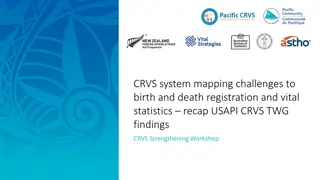NIPH Development & Priorities 2023-2024
The Norwegian Institute of Public Health (NIPH) faces financial challenges in 2023-2024, requiring strict prioritization while upholding its social mission. With established long-term goals and 10 priorities in Knowledge, Preparedness, and Infrastructure, NIPH focuses on research, advising authorities, monitoring public health, decision support, and developing critical infrastructure for public health in Norway.
Download Presentation

Please find below an Image/Link to download the presentation.
The content on the website is provided AS IS for your information and personal use only. It may not be sold, licensed, or shared on other websites without obtaining consent from the author.If you encounter any issues during the download, it is possible that the publisher has removed the file from their server.
You are allowed to download the files provided on this website for personal or commercial use, subject to the condition that they are used lawfully. All files are the property of their respective owners.
The content on the website is provided AS IS for your information and personal use only. It may not be sold, licensed, or shared on other websites without obtaining consent from the author.
E N D
Presentation Transcript
The Norwegian Institute of Public Health (NIPH) is an organization in rapid development and restructuring. In 2023 and 2024, we will be faced with a demanding financial situation. Strict prioritisation will be necessary, while adhering to our social mission. The organization s long-term development goals are well- established. Throughout the COVID-19 pandemic we have made large and rapid steps to achieve many of these goals. In the time ahead, however, we will need to adjust our level of ambition and can not expect the same rate of development in all areas. We have 10 priorities within our core tasks of Knowledge, Preparedness, and Infrastructure.
The UN Sustainable Development Goals The UN Sustainable Development Goals Public Health Goals in Norway Live Longer Live Better More Equitable Conditions
NIPH conducts research, summarizes and communicates knowledge on matters of importance to public health, such as infectious and non-infectious diseases, mental and physical health, prevention, risk factors and health promotion, and health and care services. Knowledge A key responsibility is to provide advice to the authorities, the population and the health and care services. Research and Analysis The Institute is responsible for monitoring public health, and develops management information for the government, health trusts, counties, and municipalities. Management Information Decision Support The NIPH provides decision support for prioritizing methods in the specialist health services and municipal health and care services. Vaccine knowledge is an important area of development for the Institute in the strategic period.
Norway has a unique infrastructure for knowledge where NIPH has been and will continue to be a driving force. NIPH operates and develops national infrastructure and services that Norway needs and that are a crucial resource for much of our work, also in the future. Infrastructure Our tasks are parts of an interplay of infrastructure and services among various stakeholders in and outside the health administration, where the goal is to find a balanced an efficient task distribution. Health registries Health surveys The work on knowledge and preparedness in the health sector, and societal and economic development, depends on the infrastructure evolving in line with new opportunities and challenges. This requires investments and development, to which we must find sustainable solutions. Biobanks Laboratory activities Vaccine distribution Library services NIPH will carry out a thorough assessment of the necessary infrastructure for Norway and for a future public health institute, and how it can be operated, developed and financed.
NIPH has tasks relating to biological, chemical and nuclear incidents, and disease clusters without a known cause occurring in the population. As the national institute for infection control, we have responsibilities ranging from surveillance of viruses and bacteria, to advice on vaccination and measures to the authorities, the population, microbiological laboratories and the health and care services, both prior to, during, and after crises. Preparedness Health Preparedness The NIPH operates several emergency services 24/7. An active and scientifically strong role in national and international networks is essential for good preparedness. Infection Control Surveillance Preparedness and crisis management are based on infrastructure for health and laboratory data that is used for knowledge production, surveillance, and analysis in daily work and during major incidents. Evidence syntheses, capacity for analysis and modelling, as well as communication with the population also play an important part of our emergency response functions. Advice and communication Crisis management
NIPH carries out its social mission in line with national priorities and our allocated budget. Changed framework conditions require demands substantial readjustment of the organization. 1 We shall safeguard and involve our employees and pay close attention to the working environment. The Institute aims to be an attractive workplace. Adjusting to new demands Through this readjustment, we shall ensure the necessary competence and capacity to respond to prioritised needs of national and local decision- makers, other agencies, the health and the care services, and the population. We will carry out thorough processes to set our priorities for the future. We will ensure our ability to respond to prioritized requirements from our users Organizational development will be important part of adapting to new frameworks. Important measures include seeking increased external funding where possible, performing tasks in collaboration and with new work-sharing arrangements with other actors, and emphasizing the usefulness for users when prioritizing between various activities.
Some health crises occur suddenly and require extraordinary efforts. The NIPH shall be at the forefront of knowledge internationally and provide information, advice and high quality infrastructure at the right time. Our ability to handle crises is based on expertise and capacity in our regular work outside of crises. 2 Crisis management To be strong professional advisors we must be well organised. We shall scale responses effectively and contribute to good cooperation inside and outside of the administration and across sectors during crises. Our goal is to be a reliable advisor during crisis and become experts in crisis managment. The COVID-19 pandemic has shown that there are significant opportunities to strengthen emergency preparedness work in Norway. We shall be drivers for developing a knowledge system for use during and between crises. We will improve plans for preparedness and crisis management and clarify our role in working with chemical and radionuclear preparedness.
3 NIPH is committed to making health data available for analysis and research as quickly as possible, in order to shorten the distance between idea and innovation and to benefit society. We will be drivers of easier access to data from registries and laboratories. Real-time health data During the COVID-19 pandemic, we developed new systems for faster data collection and data sharing in real time. We will keep improving these systems to make them more robust and integrated into our other activities. Privacy and information security are essential parts of this work. We will shorten the path from health data to analyses that benefit society We will publish key figures, statistics and reports which will serve as the basis for decision-making in cross-sectoral public health work and for health and care services.
4 Communication is one of the most important tools to fulfill our societal mission and is an integral part of everything we do. The open institute Our communication of knowledge and advice should meet users on their own terms and reach the whole population. To achieve this, we must have good dialogue with our target groups, through the use of clear language and relevant channels. Our communication will be open, inclusive and accessible The NIPH will participate in the public debate on our own fields of expertise and be open about uncertainty and different views on scientific issues. We shall be transparent about our work processes, methods, scientific discussions, and funding, and ensure transparency and reliability in our research.
In order to improve public health, we must have science-based knowledge about proposed measures. We need to know whether they work, what the risks are, and what they cost. This requires outstanding research, a high degree of competence and advanced methods. 5 Interventions that work We will collaborate with the public administration and the various health services on evaluating interventions, with special focus on measures that are relevant in the municipalities. Many of the current public health challenges require measures across societal sectors. We will produce evidence on which interventions are most cost-effective and in reducing inequalities. New knowledge about the effect of infection control measures, and monitoring of the effects of and adverse events from vaccination, are central tasks in following-up the various consequences of the COVID-19 pandemic.
6 The health and care services are constantly faced with increasing expectations, while resources are increasingly strained. An aging population, increased antimicrobial resistance and expensive medical technology will require health services to become increasingly efficient in the years to come. The future of health and care services There is an ever-increasing need for new knowledge as a basis for decision-making at all levels in the health and care services. The Institute will contribute with research and knowledge-support that is useful for the municipal health and care services, along with assessments of new methods in the specialist health service. We will contribute to the knowledge base for the future health and care services
7 Our society is rapidly evolving, and the pace of change seems to be ever-increasing. This creates new trends and challenges for public health in all countries. Grand societal challenges NIPH is devoted to identifying and drawing attention to major societal challenges related to health in a long-term perspective. In order to do so, we will develop new fields of research that describe problems, find causes and possible solutions to large and complex challenges in society. This requires the development of data sources that cover unanswered needs. In addition, it requires the ability to collaborate, high-level expertise and ample capacity. We will strengthen society's ability to solve new, complex health-related challenges
Increasingly, knowledge about health, health and care services comes from advanced analysis and large data sources. This gives us new opportunities and requires us to develop the competence needed to critically assess new sources of knowledge. 8 Advanced analysis NIPH describes scenarios for health threats and the health status of the population, for example using models describing the development of the burden of disease in Norway. During the COVID-19 pandemic, we have gained new experiences with modelling of infections and analysis of genetic data from microbiological laboratories that we can build on. We will make use of big data, machine learning and data modelling that is useful in public health The transformation of the Institute has consequences for our capacity to develop new expertise in advanced analysis. We will participate in relevant networks and look for opportunities, including those related to external funding.
9 NIPH has an ambition to develop new knowledge about the links between climate change and health. A key goal of this work is to prevent negative health-consequences. Climate change and health Climate change can affect the mental and physical health of the population in many different ways. The Institute s broad expertise is a good starting point for developing new knowledge about causes, risks, health effects and measures, across sectors. We aim to develop new knowledge about the links between health, climate, and the environment During the transition period, the main activities will be to participate in networks, and work to promote good externally funded projects.
10 The COVID-19 pandemic demonstrated how dependent we are on international cooperation when it comes to health preparedness. It also displayed the importance of strong and scientifically independent public health institutions in all countries. Norway in Europe and the world NIPH will contribute to the work on improving global health preparedness, in accordance with the United Nations third sustainable development goal and our national obligation under the International Health Regulations (IHR). We will contribute to better international health preparedness and stronger institutions for public health in other countries. We will work toward strengthening public health institutions and systems through Nordic cooperation, together with our international partners such as the EU, WHO, and IANPHI, and through bilateral cooperation with sister-institutions in low- and middle-income countries.
